General information on the MCTF! collections:
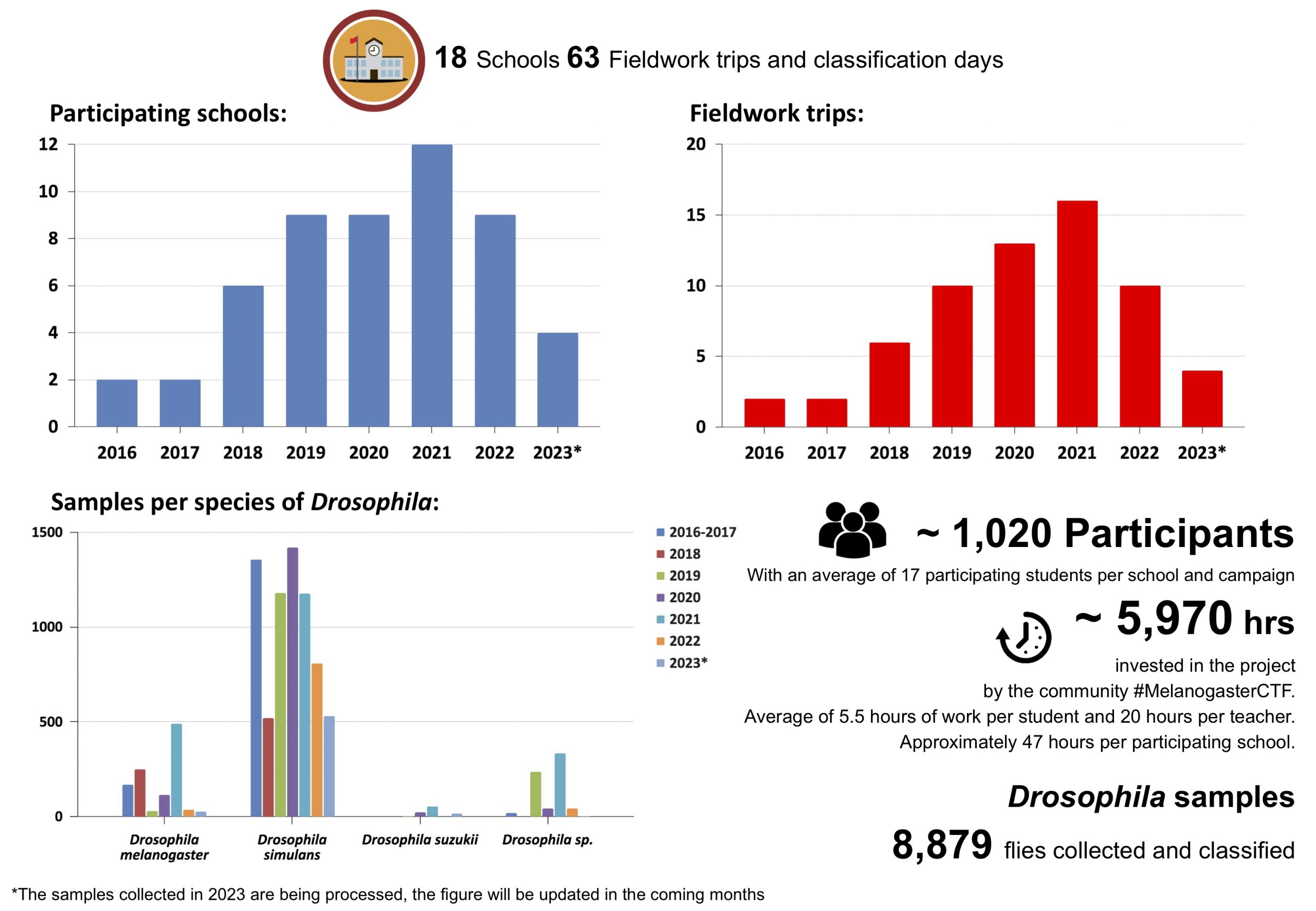
.
.
Since 2016, the collections of the MCTF project! have contributed to the European consortium DrosEU:
 Yellow: Collected; Blue: Sequenced
Yellow: Collected; Blue: Sequenced
.
Project outputs:
- 5 educational materials
- 5 video tutorials
- 3 protocols
- 3 scientific publications and 1 dissemination one
- 2 tracking apps from the Citizen Fly Lab and Track the Fly projects
- 2 technological products (Magni-Fly and Weather station Track the Fly):

.
Activities:
.
Track the fly:
- 1st operational station in September 2022
- 3 institutes with an operational weather station
- 3 institutes in the process of installation
- 1 individual interested in installing several in Teruel
- 1 instruction manual available on the web
- 1 workshop for technological improvements to the weather station
- 1 data management application (App):

.
Citizen Fly Lab:
- Design and implementation of the Citizen Fly Lab
- 10 Spanish educational centers participating in 2021-2022 and 6 educational centers in 2022-2023
- 1 educational center in Germany
- 109 participating students in 2022-2023
- 1 protocol available to centers
- 1 scientific publication
- 1 video tutorial of 58 min
- 1 presentation of the application, with the assistance of 7 teachers; 1 video generated from this presentation
- 1 application (App) to upload the results:

.
Teach and Fly:
- 4 training courses for teachers and professors (Teach and Fly), with 13 attendees in 2018, 12 attendees in 2019, 17 online attendees in 2021 and 11 attendees in 2023.
- 1 co-creation workshop to identify practices and natural events that affect biodiversity and 1 co-creation workshop for a sustainability action plan workshop.
.
Code the Fly:
- Development of the Code the Fly web portal and dissemination material
- In 2021, 120 students of the Genetics degree from the Autonomous University of Barcelona (UAB) have participated in the project, and in 2022 and 2023 60 students.
- 3 sessions of Code the Fly per year since 2021.
- 2 highschool students from the Argó Summer Stay Program, offered by the UAB, have participated in the Code the Fly activity in 2021 and 2022.
.
Scientific and dissemination publications:
.
- 1 paper in the journal Molecular Biology and Evolution from Drosophila collected by MCTF!: «Drosophila evolution over space and time (DEST): a new population genomics resource«.
- 1 paper in Proceedings of the Royal Society B on citizen science: «Promoting scientific literacy in evolution through citizen science«.
- 1 chapter in the book Transposable Elements on the Citizen Fly Lab protocol: «Experimental validation of transposable element insertions using the Polymerase Chain Reacion (PCR)«
- 1 mention of the project in the scientific journal Fly; Drosophila research status in Ukraine: «We are being blacker out, but light is within us!«.
- 1 dissemination article in the journal of the Sociedad Española de Biología Evolutiva (SESBE) eVOLUCIÓN: «La adaptación de los organismos al ambiente: una aproximación científica y ciudadana«.
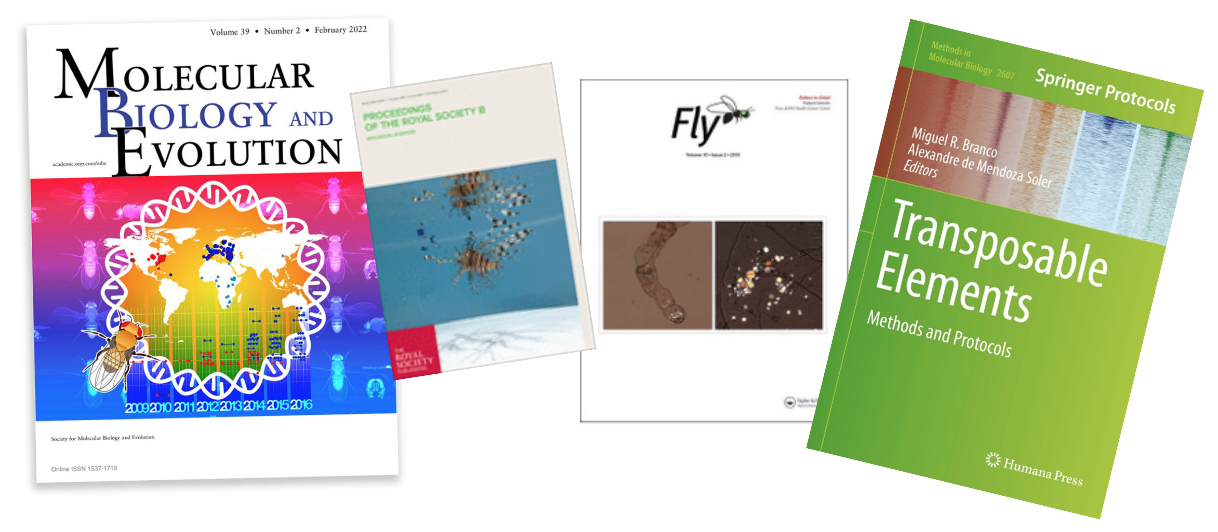
(Left) Cover of the scientific journal Molecular Biology and Evolution, highlighting an article co-authored by collaborating professors of the MCTF project!
.
.
Dissemination of the project MCTF!:
.
Dissemination by the MCTF! scientific team:
- A total number of 35 talks in national and international events.
2023 (5 events):
- “Drosophila in experimental genetics and biology”, Ukraine, 28 June 2023.
- II Jornadas de Cultura Científica, Museo Nacional de Ciencias Naturales, Madrid, 15 June 2023.
- 13th DrosEU-consortium meeting, Wageningen, The Netherlands, 8 and 9 May 2023.
- 64th Annual Drosophila Conference, Chicago, USA, 1-15 March 2023.
- Citizen Science talk at the “Campus Gutenberg”, The main Catalonian Science Communication Meeting, organized by Universitat Pompeu Fabra, Barcelona, Spain.
2022 (10 events):
- A photo of the Citizen Fly Lab project is chosen to be exhibited in the exhibition Foto-LifeHUB «Divulgación científica a través de imágenes» shown in the Museo Nacional de Ciencias Naturales, Madrid, and in the Museo Casa de la Ciencia de Sevilla.
.
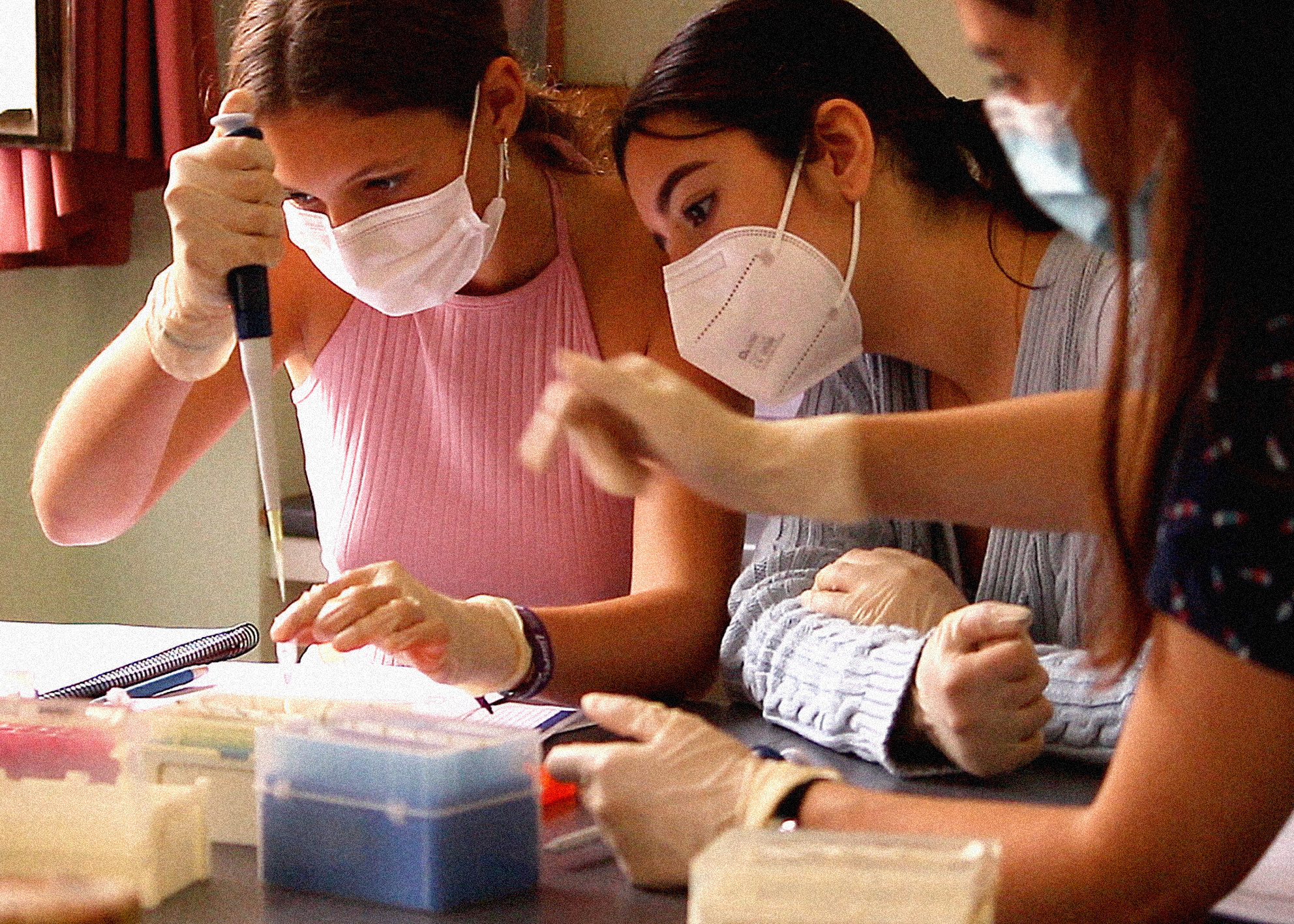
.
- Jornades de Ciència Ciutadana, Sabadell, Spain, 18-19 October 2022.
- 5th Spanish Drosophila Conference, Begur, Spain, 26-28 September 2022.
- “Promoting science literacy in evolution through Citizen Science” at the “Jornades Ciència Ciutadana”, Sabadell, Spain, 18-19 October 2022.
- ESEB 2022 (European Society for Evolutionary Biology), Prague, Czech Republic, 14-19 August 2022
- “Promoting science literacy in evolution through Citizen Science” at the European Society of Evolutionary Biology Conference, ESEB 22 in Prague. Symposia S24 “Progress and prospects in adaptation genomics”.
- Jornada de Biologia Evolutiva, Barcelona, July 2022.
- Max Planck Annual Symposium, 26-27 September 2022.
- Innovative education conference “Our classrooms open to science” Hosted By MUDIC – CEFIRE (Generalitat Valenciana).
-
ERC Citizen Science and Frontier Research: ERC Annual Event 2022, Brussels, Belgium
MCTF! had an important representation at the “ERC Citizen Science and Frontier Research: ERC Annual Event 2022”, held in Brussels, Belgium, on December 7, 2022, in which Dr. Josefa González gave a talk about MCTF!
In the context of the same event, two of the schools participating in the project were selected to share their experience in the online section “Young people engaged for the planet”: the IES Eladio Cabañero, Tomelloso, and the Mriya School, Ukraine, Odesa. The intervention was broadcast live for the general public and can be viewed again. The project was also included in a virtual sample of citizen science projects.
This event is highlighted in the ERC annual report, with photos including the scientific director of the project;


2021 (7 events):
- XVII ENBE Annual meeting of the Portuguese association for evolutionary biology, 16-17 December 2021.
- International Congress on Transposable elements, virtual, December 2021.
- XVIII Congreso Latinoamericano de Genética. ALAG2021, virtual, 5-8 October 2021.
- The second AsiaEvo Conference. Tokyo metropolitan university, virtual, 16-19 August 2021.
- Society for Molecular Biology and Evolution 2021, virtual, 3-8 July 2021.
- XLII Congreso de la Sociedad Española de Genética. SEG2021, virtual, 14-18 June 2021.
- 62nd Drosophila Research Conference, 1 April 2021.
2020 (4 events):
- European Citizen Science Association (ECSA) Conference, Trieste, Italy, September 7th. Oral presentation in the Citizen science case studies: insect monitoring Symposium.
- Cross- COST Action Citizen Science Working Meeting, Berlin Natural History Museum, Germany, 13th and 14th January 2020.
- EMBO/EMBL The Organism and its Environment. Heidelberg, Germany.
- SESBE2020, Sevilla, Spain.
2019 (5 events):
- Citizen Science Workshop, 2019 Congress of European Society for Evolutionary Biology (ESEB), Turku, Findland.
- Science Communication Training School “Citizen Science Good Practices”, organized by The Spanish National Research Council (CSIC), Madrid, Spain.
- The mobile DNA conference: 25 years of discussion and research. Palm Springs, California, USA.
- Citizen Science talk a “Campus Gutenberg”, The main Catalonian Science Communication Meeting, organized by Universitat Pompeu Fabra, Barcelona.
- VII Congress of Social Communication of Science, organizado por The Spanish Association of Scientific Communication (AECC), Burgos, Spain.
2018 (1 event):
- EuroScitizen COST action presentation at the “Campus Gutenberg”, the main Catalonian Science Communication Meeting, organized by Universitat Pompeu Fabra, Barcelona, Spain.
2017 (3 eventos):
- X Symposium on Ecology, Genetics and Evolution of Drosophila. Ouro Preto, Brazil.
- Congress of the European Society for Evolutionary Biology. Groningen, the Netherlands.
- Evoke meeting in Porto, Portugal. Presenting the Citizen Science project “Melanogaster, Catch The Fly” Poster session, and kick-off meeting of the EUroScitizen Network.
.
Selection of dissemination events of the project by students and teachers (Conferences, meetings, and the media):
- I Feria de la Ciencia y la Innovación de Asturias, Oviedo, Spain, 17 November 2022.
- Interview on November 16, 2023 on RTPA (Radio Televisión del Principado de Asturias).
- Jornadas “Compartiendo prácticas educativas innovadoras en contextos híbridos inclusivos”, Oviedo, Spain, 17 April 2023.
- IV Jornadas STEAM of the Centro Regional de Formación del Profesorado de la Consejería de Educación, Cultura y Deporte de Castilla La Mancha, Spain, 29 May 2023.
- CEPA Simienza, Tomelloso, Castilla La Mancha, Spain, 20 February 2023.
- 19ena Conferencia Internacional Hands-on Science (HSCI2022), Burgos, Spain, 25-29 July 2022.
- Presentation of the “Virus de Tomelloso”, Tomelloso, Spain, 9 March, 2019.
- 1 podcast produced, winner of the Best Science Communication Podcast Award: Melanogaster Catch The Fly. Radiolab Digital Radio Contest – Universidad de Granada.
.
Online and face-to-face impact:
In 2023:
- 159,691 online impacts, including 63,638 views on Twitter and 5,456 on Instagram.
- 649 followers on Instagram, 1,683 on Facebook, 2,471 on Twitter, 7.000 visits to the MCTF project website.
- 5,400 face-to-face participants among the numerous project dissemination activities carried out by the MCTF team! and by the students and teachers of the participating centers.
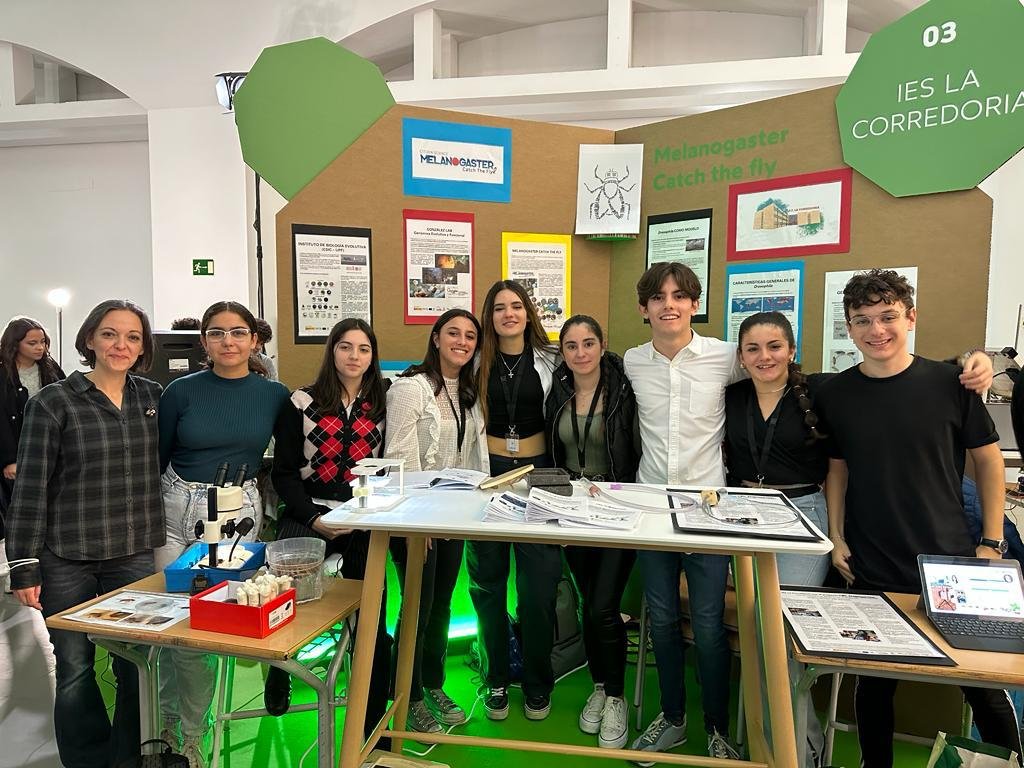
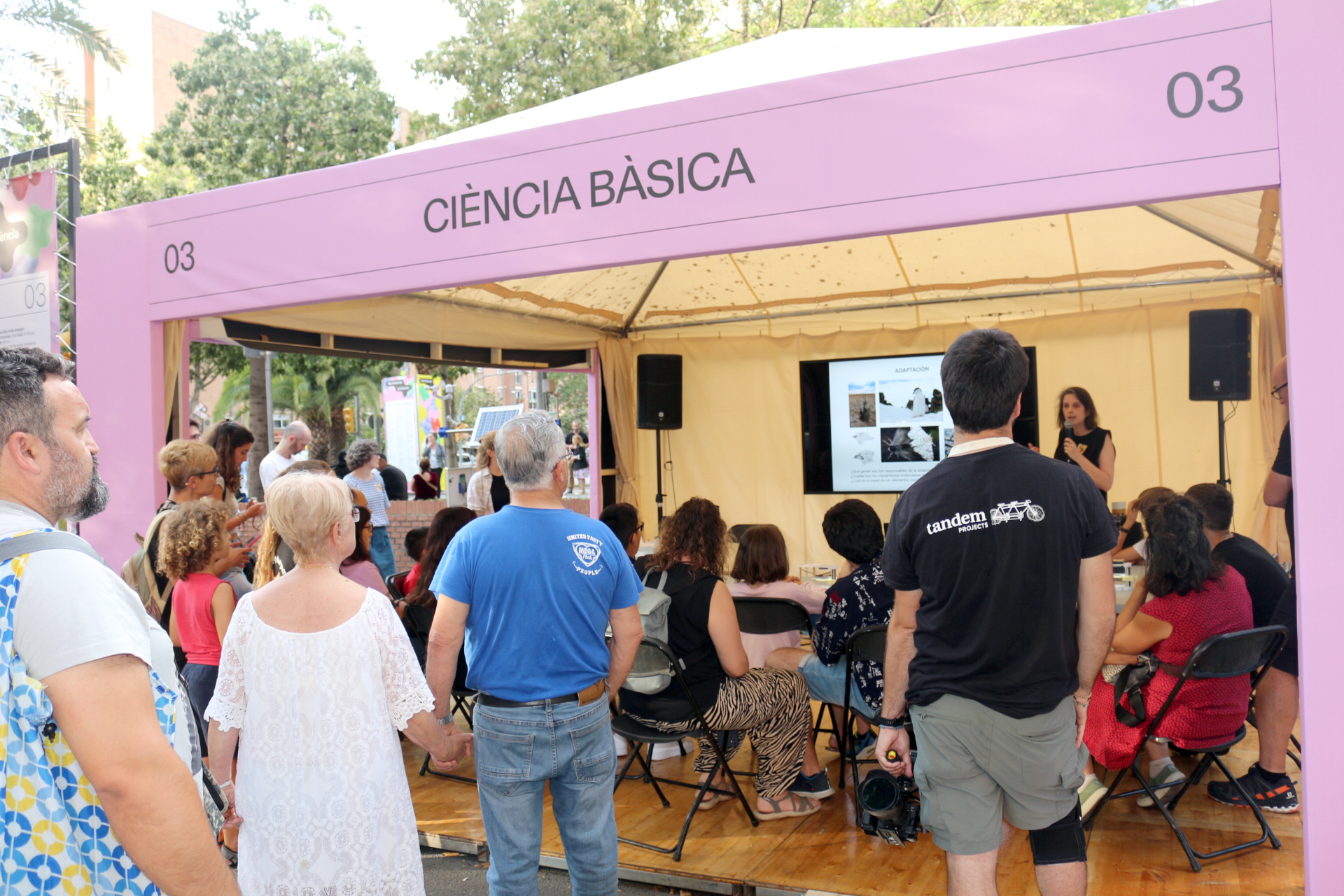
.
 What together we have achieved with this little fruit fly
What together we have achieved with this little fruit fly
-
-
- Bring science closer to Society and demonstrate the potential of civil society for the advancement of science
- Make society aware of the importance of basic science.
- Contribute to the advancement of international cutting-edge science.
- Established a dynamic working relationship between the scientific community and society through your institutes and localities.
- Contribute and innovate in different ways.
- Motivate others to join the project.

-
Knowledge generators / Change agents in the face of major social challenges such as global change.
/ Change agents in the face of major social challenges such as global change.





